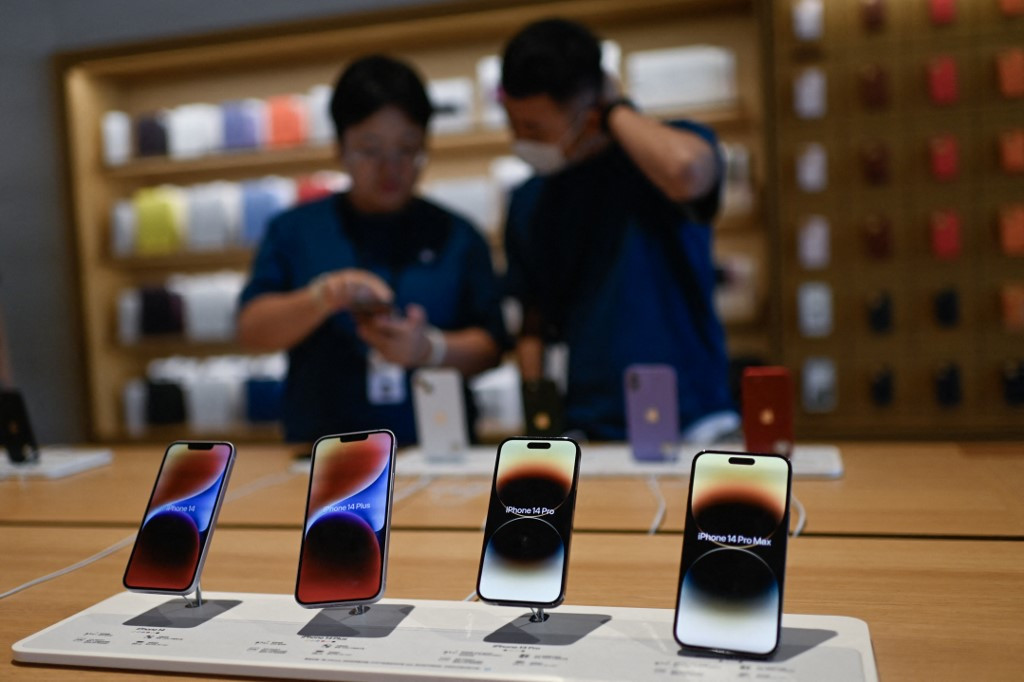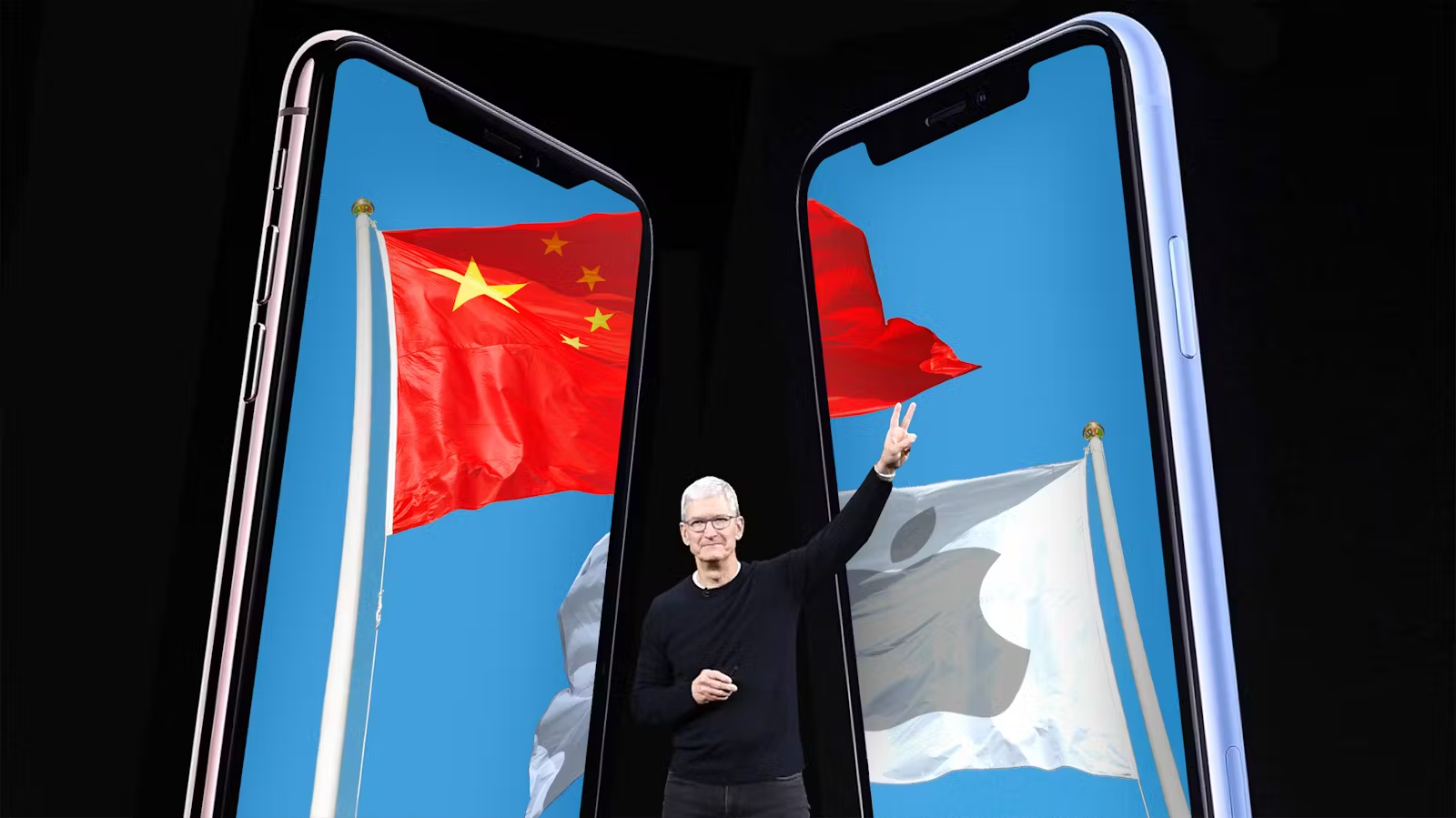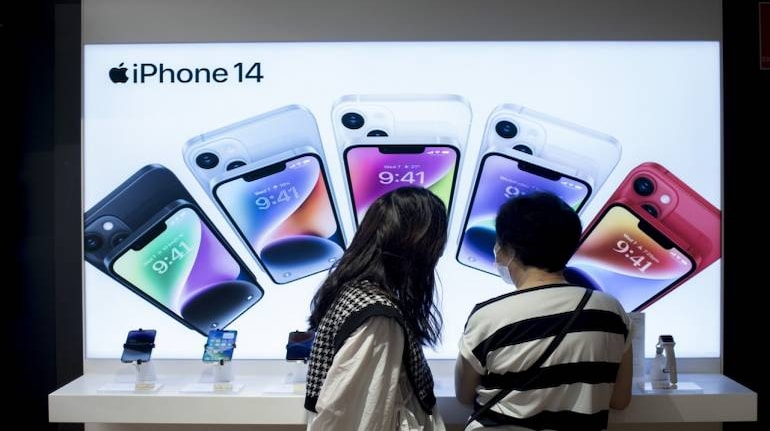How did Apple’s iPhone sales perform in China during the first week of 2024?
In the first week of 2024, Apple faced a significant setback in China as iPhone sales plummeted by over 30% compared to the previous year. This decline stood in stark contrast to competitors like Huawei, which maintained a much stronger market position during the same period.
Table of Contents
Understanding the Numbers
According to Jefferies analysts, Apple’s sales in China were adversely impacted, leading to a double-digit volume drop anticipated for the entire year. The decline was particularly noticeable in the first week of January, creating concerns among investors and industry observers.
Market Dynamics

Jefferies analysts pointed out that Huawei, Apple’s main competitor in the Chinese market, experienced a contrasting trajectory, gaining about 6% in smartphone market share in 2023. This shift emphasized a significant market preference for Huawei over Apple during this period.
Potential Factors
The analysts attributed the decline not only to Huawei’s influence but also to the competition from other brands like Xiaomi. This cannibalization effect raised questions about Apple’s strategy and its ability to retain market share in the face of growing competition.
Financial Impact
The repercussions of the sales decline were felt in Apple’s stock performance, as shares experienced a dip following downgrades from Barclays and Piper Sandler. Moreover, concerns about first-quarter revenue decline, coupled with reports of a potential antitrust lawsuit by the U.S. government, added to the challenges faced by the tech giant.
Defensive Measures
To counter the decline in market share, Apple implemented strategies such as increasing iPhone discounts in China. Jefferies analysts noted a significant rise in discounts for certain iPhone 14 models, indicating an effort to defend Apple’s share in the competitive Chinese market.
Share Market Insights

The note from Jefferies highlighted that while Huawei’s market share in China surged, Apple’s share fell approximately 4% year over year. This shift underscored the need for Apple to reassess its approach and regain ground in a rapidly evolving smartphone landscape.
Stock Movement
Despite the challenges, Apple’s stock showed resilience in premarket trading, with a less than 1% decline. The announcement of the release date for Apple’s Vision Pro headset subsequently led to a more than 2% increase in shares, showcasing the potential for strategic product launches to influence market sentiment.
The first week of 2024 posed considerable challenges for Apple in the Chinese market, with a substantial decline in iPhone sales. This article delved into the key factors contributing to this setback and highlighted the competitive landscape that Apple must navigate to regain its foothold in China.
What are the reasons behind Apple’s declining market share in China?
Apple’s diminishing market share in China has raised eyebrows, especially in contrast to the growth observed by its competitors, particularly Huawei.
Competitive Landscape

The Jefferies analysts’ note revealed that Huawei secured the highest smartphone market share in China in 2023, marking a notable 6% year-over-year increase. In contrast, Apple witnessed a decline of around 4% during the same period, signaling a significant shift in consumer preferences.
Cannibalization Effect
The analysts pointed out that the cannibalization effect was not limited to Huawei alone; other players, including Xiaomi, also played a role in eroding Apple’s market share. This insight highlighted a broader challenge for Apple – retaining its position in a market increasingly dominated by diverse competitors.
Market Dynamics
To understand the decline, one must consider the overall dynamics of the Chinese smartphone market. The note emphasized that Apple’s lower market share year over year was indeed a negative surprise, necessitating a closer examination of market trends and consumer behavior.
Impact on Stock Performance
The decline in market share directly affected Apple’s stock performance, with shares experiencing a dip following downgrades and warnings from industry experts. This impact on stock prices highlighted the financial implications of Apple’s market share challenges in China.
Strategic Measures
In response to the decline, Apple took defensive measures, such as increasing discounts for certain iPhone 14 models in China. This strategic move aimed to protect its share in the face of intensifying competition and shifting consumer preferences.
Future Revenue Pressure
Jefferies analysts projected that Apple would face even higher revenue pressure in China throughout 2024. This anticipation urged Apple to reevaluate its market strategies and consider innovative approaches to regain consumer trust and market share.
Apple’s market share decline in China is a multifaceted issue, influenced by both external market forces and internal competition. This article examined the various factors contributing to this decline and emphasized the importance of strategic planning for Apple’s sustained success in the Chinese smartphone market.
How did Huawei manage to gain the most smartphone market share in China in 2023?
In 2023, Huawei emerged as a frontrunner in the Chinese smartphone market, securing the highest market share and outperforming its competitors, including Apple.

Market Dynamics
Jefferies analysts’ note highlighted that Huawei’s success was characterized by a significant 6% year-over-year increase in smartphone market share in China. Understanding the factors contributing to this success is crucial for evaluating Huawei’s competitive strategy and market positioning.
Product Innovation
One key aspect of Huawei’s success was likely its commitment to product innovation. The company’s ability to introduce new and appealing smartphone models resonated well with Chinese consumers, contributing to the surge in market share.
Consumer Preferences
Huawei’s success also pointed to a deep understanding of local consumer preferences. By aligning its product offerings with the specific needs and desires of the Chinese market, Huawei effectively captured the attention and loyalty of a significant consumer base.
Competitive Pricing
The analysts’ note did not explicitly mention pricing strategies, but it is conceivable that competitive pricing played a role in Huawei’s success. Offering value for money and competitive pricing could have been a crucial factor in attracting consumers in a market known for its sensitivity to price.
Brand Trust
Building and maintaining trust is vital in any market, and Huawei’s success in China likely stems from the trust it has cultivated among consumers. This trust may be attributed to the consistent quality of its products and a positive brand image in the eyes of Chinese consumers.
Marketing Strategies
Huawei’s marketing strategies, including effective brand positioning and communication, likely contributed to its market share gains. By conveying a compelling brand story and showcasing the unique features of its products, Huawei managed to stand out in a crowded market.
Huawei’s ascendancy in gaining the most smartphone market share in China in 2023 was a result of a combination of factors, including product innovation, understanding consumer preferences, competitive pricing, brand trust, and effective marketing. Analyzing these elements provides valuable insights into Huawei’s success and serves as a benchmark for other players in the Chinese smartphone market.
What were the repercussions of Apple’s declining market share on its stock performance?
Apple’s declining market share in China had a direct impact on its stock performance, with notable consequences for investors and the broader financial market.

Stock Downturn
Following the revelation of the substantial decline in iPhone sales in China, Apple’s stock experienced a downturn. This was exacerbated by downgrades from prominent financial institutions
, including Barclays and Piper Sandler, which further eroded investor confidence.
Investor Concerns
Investors, observing the decline in market share and the corresponding dip in stock prices, raised concerns about the long-term sustainability of Apple’s growth. The Chinese market, being a significant revenue contributor, added an additional layer of worry for investors.
Supplier Warnings
Compounding the challenges, Apple’s key supplier, Foxconn, issued warnings about a first-quarter revenue decline. This news served as a red flag for investors, indicating potential challenges in the supply chain that could further impact Apple’s financial performance.
Antitrust Lawsuit
The situation was further complicated by reports that the U.S. government was preparing an antitrust lawsuit against Apple. While the details of the lawsuit were not specified, the mere prospect of legal challenges added uncertainty to Apple’s outlook and contributed to the downward pressure on its stock.
Resilience in Pre-market Trading
Despite the challenges, Apple demonstrated resilience in premarket trading, with the stock only experiencing a modest decline of less than 1%. This indicated a nuanced response from the market, suggesting that investors were weighing the negative news against the broader context of Apple’s overall business.
Vision Pro Headset Announcement
The announcement of the release date for Apple’s Vision Pro headset acted as a positive catalyst for the stock. Shares closed up more than 2% following the news, underscoring the potential influence of strategic product announcements on market sentiment.
The repercussions of Apple’s declining market share in China were evident in its stock performance, triggering concerns among investors. This article explored the various factors contributing to the stock downturn and highlighted the nuanced response of the market to both negative and positive developments in Apple’s business landscape.
How did Huawei manage to gain the most smartphone market share in China in 2023?
In 2023, Huawei emerged as a frontrunner in the Chinese smartphone market, securing the highest market share and outperforming its competitors, including Apple.
Market Dynamics
Jefferies analysts’ note highlighted that Huawei’s success was characterized by a significant 6% year-over-year increase in smartphone market share in China. Understanding the factors contributing to this success is crucial for evaluating Huawei’s competitive strategy and market positioning.
Product Innovation
One key aspect of Huawei’s success was likely its commitment to product innovation. The company’s ability to introduce new and appealing smartphone models resonated well with Chinese consumers, contributing to the surge in market share.
Consumer Preferences
Huawei’s success also pointed to a deep understanding of local consumer preferences. By aligning its product offerings with the specific needs and desires of the Chinese market, Huawei effectively captured the attention and loyalty of a significant consumer base.
Competitive Pricing
The analysts’ note did not explicitly mention pricing strategies, but it is conceivable that competitive pricing played a role in Huawei’s success. Offering value for money and competitive pricing could have been a crucial factor in attracting consumers in a market known for its sensitivity to price.
Brand Trust
Building and maintaining trust is vital in any market, and Huawei’s success in China likely stems from the trust it has cultivated among consumers. This trust may be attributed to the consistent quality of its products and a positive brand image in the eyes of Chinese consumers.
Marketing Strategies
Huawei’s marketing strategies, including effective brand positioning and communication, likely contributed to its market share gains. By conveying a compelling brand story and showcasing the unique features of its products, Huawei managed to stand out in a crowded market.
Huawei’s ascendancy in gaining the most smartphone market share in China in 2023 was a result of a combination of factors, including product innovation, understanding consumer preferences, competitive pricing, brand trust, and effective marketing. Analyzing these elements provides valuable insights into Huawei’s success and serves as a benchmark for other players in the Chinese smartphone market.
How did Huawei manage to gain the most smartphone market share in China in 2023?
In 2023, Huawei emerged as a frontrunner in the Chinese smartphone market, securing the highest market share and outperforming its competitors, including Apple.
Market Dynamics
Jefferies analysts’ note highlighted that Huawei’s success was characterized by a significant 6% year-over-year increase in smartphone market share in China. Understanding the factors contributing to this success is crucial for evaluating Huawei’s competitive strategy and market positioning.
Product Innovation
One key aspect of Huawei’s success was likely its commitment to product innovation. The company’s ability to introduce new and appealing smartphone models resonated well with Chinese consumers, contributing to the surge in market share.
Consumer Preferences
Huawei’s success also pointed to a deep understanding of local consumer preferences. By aligning its product offerings with the specific needs and desires of the Chinese market, Huawei effectively captured the attention and loyalty of a significant consumer base.
Competitive Pricing
The analysts’ note did not explicitly mention pricing strategies, but it is conceivable that competitive pricing played a role in Huawei’s success. Offering value for money and competitive pricing could have been a crucial factor in attracting consumers in a market known for its sensitivity to price.
Brand Trust
Building and maintaining trust is vital in any market, and Huawei’s success in China likely stems from the trust it has cultivated among consumers. This trust may be attributed to the consistent quality of its products and a positive brand image in the eyes of Chinese consumers.
Marketing Strategies
Huawei’s marketing strategies, including effective brand positioning and communication, likely contributed to its market share gains. By conveying a compelling brand story and showcasing the unique features of its products, Huawei managed to stand out in a crowded market.
Huawei’s ascendancy in gaining the most smartphone market share in China in 2023 was a result of a combination of factors, including product innovation, understanding consumer preferences, competitive pricing, brand trust, and effective marketing. Analyzing these elements provides valuable insights into Huawei’s success and serves as a benchmark for other players in the Chinese smartphone market.
How did Huawei manage to gain the most smartphone market share in China in 2023?
In 2023, Huawei emerged as a frontrunner in the Chinese smartphone market, securing the highest market share and outperforming its competitors, including Apple.
Market Dynamics
Jefferies analysts’ note highlighted that Huawei’s success was characterized by a significant 6% year-over-year increase in smartphone market share in China. Understanding the factors contributing to this success is crucial for evaluating Huawei’s competitive strategy and market positioning.
Product Innovation
One key aspect of Huawei’s success was likely its commitment to product innovation. The company’s ability to introduce new and appealing smartphone models resonated well with Chinese consumers, contributing to the surge in market share.
Consumer Preferences
Huawei’s success also pointed to a deep understanding of local consumer preferences. By aligning its product offerings with the specific needs and desires of the Chinese market, Huawei effectively captured the attention and loyalty of a significant consumer base.
Competitive Pricing
The analysts’ note did not explicitly mention pricing strategies, but it is conceivable that competitive pricing played a role in Huawei’s success. Offering value for money and competitive pricing could have been a crucial factor in attracting consumers in a market known for its sensitivity to price.


